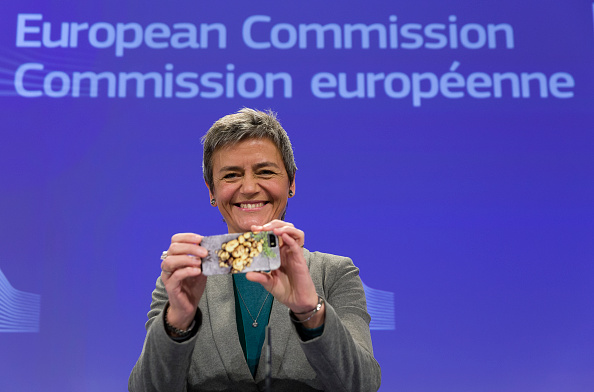The digital euro’s launch looks likely to be pushed back substantially from its 2027 goal.
The European Central Bank still needs to overcome tepid support from commercial banks and citizens, financiers and researchers told Brussels Signal.
The European Central Bank (ECB) envisages its digital money project as a way of preserving the euro as a leading reserve currency and preventing a private cryptocurrency or another central banks’ digital offering from taking the initiative.
Some 130 countries representing 98 per cent of the global economy are now exploring digital versions of their central bank currencies (CBDCs), according to Reuters, so the digital euro will face stiff competition – especially from China’s computerised yuan.
“I would be surprised if this [European move] happens before 2030,” said Lambis Dionysopoulos, a research fellow at the Digital Euro Association think-tank.
Beating China out of the digital currency gates could be particularly tricky.
Some more “centralised” jurisdictions, such as China, might well move more quickly, Dionysopoulos said.
A key hurdle ahead will be cost. Developing the infrastructure will cost more than €1 billion, the ECB has estimated, as there is no existing private digital payment service network.
“It should be fine for the end user as it is supposed to be a free service but implementation costs will likely crawl themselves into the end price of products or services,” said Matej Mesko, a banker in Frankfurt.
Projected costs have led to the ECB scaling down some of its ambitions for the digital currency, too.
“We have progressively moved from more ‘radical’ CBDC proposals, where the bank builds and operates the entire infrastructure, to comparatively more moderate solutions resembling existing systems,” Dionysopoulos said.
The digital currency will also have to overcome citizens’ concerns about potential government monitoring.
“I think we underestimate the extent to which people will demonise CBDCs and similar solutions, especially after the significant crisis of trust in authority over the past 15 years or so,” added Dionysopoulos.
The Cato Institute, a Washington, DC-based libertarian think-tank, has previously claimed CBDCs will be used as “a tool for coercion and control” and “allow the government to spy on” users.
Dionysopoulos said one way to mitigate such fears was to “offer more control and transparency to the public and involve publicly elected institutions in the process, rather than relying on technocrats”.
Conversely, generating sufficient enthusiasm for a digital euro among its target audience could be a challenge, too.
Kene Ezeji-Okoye, a tech start-up co-founder and member of the Bank of England’s CBDC Technology Forum, said: “Many will continue to label any retail CBDC as a ‘solution in search of a problem’.
Mesko added: “With so many payment method options already available, I think people will be reluctant to change their habits of paying, let’s say, with Apple Pay.”
Marketing for a digital euro so far has been focused on “disrupting existing-use cases that are already relatively well served by card networks, fintech apps, and SEPA Instant [credit transfer system] – all difficult incumbents to displace”, according to Ezeji-Okoye.
Doing so is made harder because “despite the strong arguments in favour of a digital euro, the average person doesn’t think about things like the ‘singleness of money’ or the importance of sovereign payment networks,” he added.
Unlike popular cryptocurrencies such as Bitcoin and Ethereum, CBDCs will be issued by a central bank and denominated in its sovereign currency.
Cryptocurrencies are “like money”, say financial experts, but are not “exactly money”.
They might best be thought of as “in some circumstances … an alternative to money”, the ECB has said.
Bitcoin and its rivals do not “have all the attributes of real currency” and do “not have legal-tender status” anywhere, the US Department of Treasury has pointed out.
Being regulated by a central bank, a CBDC’s value would not experience the sometimes tumultuous rises and falls of cryptocurrencies, a trait that has made them a popular speculative investment for both professional and amateur players.
It seems CBDCs would prove less useful for getting rich quick but may provide a more stable store of value, analogous to a bank-held current account.
Despite concerns, Mesko insisted the ECB is “moving ahead as it is a done deal, while waiting for regulatory aspects to fall into place, as support of a legal tender and overall buy-in from other EU institutions”.
In parallel it is “marketing the service so it gets more recognisable to the public with time”, he added.
For many though, questions remain.
These include whether “interoperability with other CBDCs will be possible or not”, Mesko agreed.
If so, “who will be the actor in the middle” and would the Belgian banking co-operative Society for Worldwide Interbank Financial Telecommunication (SWIFT) be “keeping the monopoly as a network service provider”, he said.
Given the potential difficulties, said Mesko, “to me it seems the pros can easily be countered with cons” of the digital euro.
Ezeji-Okoye added that, even with so many aspects still unaddressed, “to my knowledge, there hasn’t been a cost or cost-benefit analysis”.
“But I expect the project to be implemented regardless, as it is not just an exercise in cost-benefit analysis, but rather a strategic policy decision,” he predicted.





